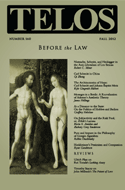Geoffrey Holsclaw’s “At a Distance to the State: On the Politics of Hobbes and Badiou” appears in Telos 160 (Fall 2012). Read the full version online at the Telos Online website, or purchase a print copy of the issue here.
 Amid the contested status of the State, juxtaposing the political thought of Thomas Hobbes and Alain Badiou will facilitate a renewed questioning of the State itself. Hobbes stands near the beginning of the tradition of those using “State” as a term for the impersonal form of political authority between ruler and ruled, understanding politics as culminating in the State. Badiou, on the other hand, while assuming the basic conviction of the impersonal nature of the State, theorizes a space for politics at a distance to the State. This encounter is promising not only because of their differences, but because of their similarities. Both take mathematics as the key to their philosophical method. Both envision the primary situation as a tumultuous “multitude” or “multiplicity.” And both understand politics as the creation of a “One.” Yet their overriding difference is manifest in the position of the State in relation to the production of the One, and therefore politics itself. For Hobbes, politics culminates in the formation of the One within the State, or rather, as the State. For Badiou, politics occurs as the pronouncement of a One at a distance to the State. After showing how Badiou moves through and beyond Hobbes, this essay explores the upshot of Badiou’s understanding of politics in relation to other political theories, particularly how recent proposals from within a pragmatist-Hegelian framework hold a hidden alliance with Hobbesian contract theory.
Amid the contested status of the State, juxtaposing the political thought of Thomas Hobbes and Alain Badiou will facilitate a renewed questioning of the State itself. Hobbes stands near the beginning of the tradition of those using “State” as a term for the impersonal form of political authority between ruler and ruled, understanding politics as culminating in the State. Badiou, on the other hand, while assuming the basic conviction of the impersonal nature of the State, theorizes a space for politics at a distance to the State. This encounter is promising not only because of their differences, but because of their similarities. Both take mathematics as the key to their philosophical method. Both envision the primary situation as a tumultuous “multitude” or “multiplicity.” And both understand politics as the creation of a “One.” Yet their overriding difference is manifest in the position of the State in relation to the production of the One, and therefore politics itself. For Hobbes, politics culminates in the formation of the One within the State, or rather, as the State. For Badiou, politics occurs as the pronouncement of a One at a distance to the State. After showing how Badiou moves through and beyond Hobbes, this essay explores the upshot of Badiou’s understanding of politics in relation to other political theories, particularly how recent proposals from within a pragmatist-Hegelian framework hold a hidden alliance with Hobbesian contract theory.







